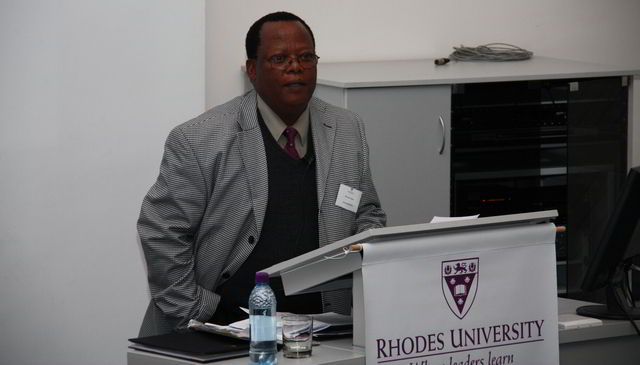
It is with great sadness that we record the passing of a former staff member in the Faculty of Law, Professor Emeritus Richman Mqeke.
Bangilizwe Richman Mqeke completed his BJuris and LLB degrees at the University of Fort Hare in the 1970s – no mean feat at a time of great political upheaval at that university under apartheid. Richman began his legal career as a public prosecutor in the magistrates’ and regional magistrates’ courts in Mthatha, and was admitted as an advocate of the Supreme Court of South Africa. However, he never felt comfortable as a practitioner and, in 1977, motivated by his passion for the academic life, he returned to a position at his alma mater, Fort Hare. While at Fort Hare, he completed an LLM degree (Traditional and Modern Law of Procedure and Evidence in the Chief’s Courts of the Ciskei) through Rhodes University under the supervision of Professor Alastair Kerr, and then an LLD degree (Basic Approaches to Problem Solving in Customary Law: A Study of Conciliation and Consensus among the Cape Nguni) through Fort Hare itself. He rose to the rank of professor, and also served as Dean of Law for a period.
In the 1990s, Richman took up the position of Registrar at the then University of Transkei. However, he found the life of an administrator sterile and unfulfilling, and was drawn back to academia, this time taking up a chair at Rhodes University in 1997: the first black professor of Law in Rhodes’s history. He remained at Rhodes until his retirement at the end of 2013, serving also as the first black Dean of the Law Faculty (or any Faculty at Rhodes, for that matter) from 2001 to 2003, and again in 2008.
Richman’s research interests lay in customary law, property law and jurisprudence, in which he published a wide range of articles in many of the leading law journals in South Africa. He published two books, Basic Approaches to Problem Solving in Customary Law (1997) and Customary Law and the New Millennium (2003). He was a member of a number of journals’ editorial boards, and was a member of the Academy of Science of South Africa. In 2001/2, Richman held office as the first black President of the Society of Law Teachers of Southern Africa, and later in his career he represented the Society of Law Teachers on the Council of the South African Judicial Institute. After taking retirement, he served on the South African Law Reform Commission’s Project Committee on Traditional Courts, and was involved in the preparation of the Traditional Courts Bill.
Richman was a gentleman and a scholar of the old-fashioned variety, who was never to be seen other than in a jacket and tie. His primary interest was research – so much so that when he had to be hospitalised some fifteen years ago for a brief illness, colleagues who visited him found him propped up in bed in his ward, reading the latest important court judgment on customary law in the law reports. His teaching style was equally to expect his students to read extensively and deeply for themselves: something that did not always sit well with the modern student, who prefers direct teaching. But even if students would occasionally grumble about what was expected of them in his classes, and his spidery handwriting on the board, every student admired and respected him for his passion for what he did, what he had achieved as an academic, and how he was always kind, sincere and encouraging in his feedback. His colleagues remember him with great fondness as a gentle, noble voice of reason, a calming, stabilising influence on the direction of the Faculty, and as a true role model of what it is to be an academic.
Our condolences go out to his family, friends and colleagues.

